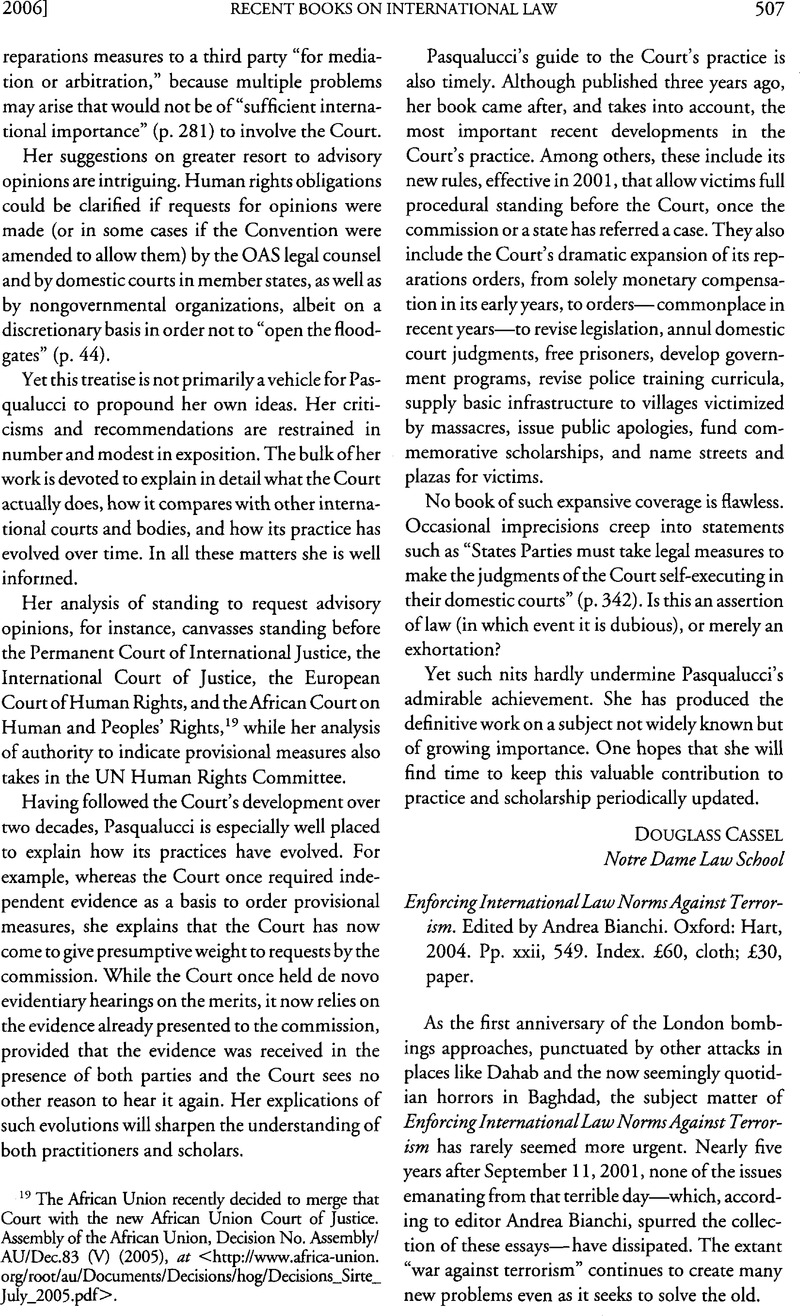No CrossRef data available.
Published online by Cambridge University Press: 27 February 2017

1 The term is used in this review in accordance with the proposed definition from A More Secure World: Our Shared Responsibilities, Report of the High-Level Panel on Threats, Challenges and Changes, para. 164, UN Doc. A/59/565 (2004). Paragraph 164(d) of the report suggests that terrorism should be understood as “any action, in addition to actions already specified by the existing conventions on aspects of terrorism, the Geneva Conventions and Security Council resolution 1566 (2004), that is intended to cause death or serious bodily harm to civilians or non-combatants, when the purpose of such an act, by its nature or context, is to intimidate a population, or to compel a Government or an international organization to do or to abstain from doing any act.” The definition excludes state violence on the ground that such conduct is already covered by the Geneva Conventions and other instruments, including international criminal law (para. 164(a)). The report argues that “the legal and normative framework against State violations is far stronger than in the case of non- State actors” (para. 160). It also rejects any possible justification for terrorism as such, specifically excluding military occupation as a legal excuse (id).
2 See, e.g., Sale, Richard, Analysis: Hamas History Tied to Israel, United Press International, June 18, 2002 Google Scholar (on file with author).
3 See, e.g., Human Watch, Rights, Backgrounder on Afghanistan: History of the War (Oct. 2001)Google Scholar, at <http://www.hrw.org/backgrounder/asia/afghan-bck1023.htm>.
4 For the argument about the impact of fundamentalist movements, including in the Muslim religion, on women’s human rights, see Howland, Courtney, The Challenge of Religious Fundamentalism to the Liberty and Equality Rights of Women: An Analysis Under the United Nations Charter, 35 Colum. J. Transnat’l L. 271 (1997)Google Scholar.
5 See Bennoune, Karima, A Disease Masquerading as a Cure: Women, Fundamentalism and Human Rights in Algeria. An Interview with Mahfoud Bennoune, in Nothing Sacred: Women Respond To Religious Fundamentalism And Terror 75 (Reed, Betsy ed., 2002)Google Scholar.
6 The recommendations, updated in October 2004, are available at <http://www.fatf-gafi.org>.
7 A More Secure World, supra note 1, para. 152.
8 Id., para. 149.
9 Roy, Olivier, Why Do They Hate Us? Not Because of Iraq, N.Y. Times, July 22, 2005, at A21 Google Scholar.
10 Louise Arbour, UN High Commissioner for Human Rights, Keynote Address at the International Commission of Jurists Biennial Conference: Security Under the Rule of Law 15 (Aug. 27-28), at <http://www.icj.org/IMG/pdf/speechone.pdf>.
11 Id at 15-16.
12 Benhabib, Seyla, Unholy Wars, in Nothing Sacred, supra note 5, at 397 Google Scholar.